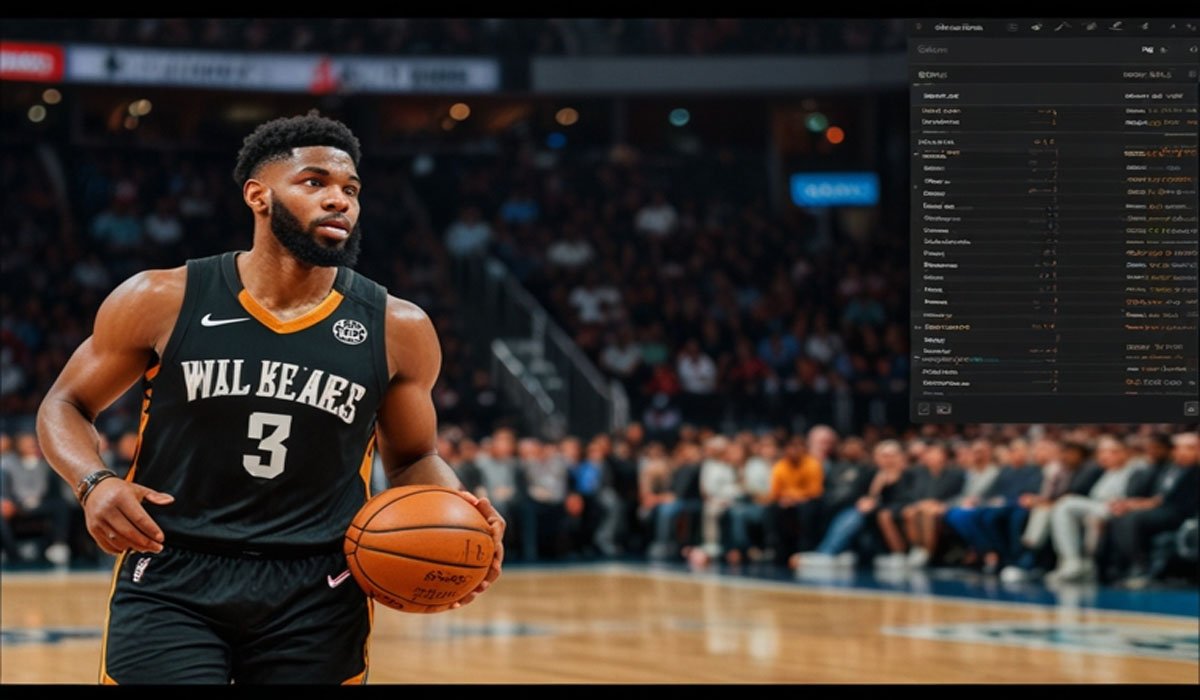Imagine the roar of the crowd fading, the locker room quieting. While you might picture stars scrolling social media or gaming, a surprising number are diving into a different kind of arena: GitHub. That’s right, the platform synonymous with hoodie-clad developers is now hosting commits from athletes known more for their crossover than their code commits. Think it’s sci-fi? Check the repos – it’s 2024’s reality. Basketball stars GitHub profiles are becoming unexpected treasure troves, revealing passions far beyond the hardwood.
Forget the stereotype. These athletes aren’t just endorsing tech; they’re building it, learning it, and sharing it. Their GitHub activity offers a fascinating glimpse into their intellectual hustle, proving the drive that fuels their on-court dominance extends to keyboards and algorithms. Let’s break down why this is happening and what we can learn from it.
Why Ballers are Bashing Keys: The GitHub Appeal
What draws elite athletes to the world of version control and pull requests? It’s not just a passing fad:
- Mind Training: Coding is problem-solving under pressure. Breaking down complex logic, debugging errors – it’s mental conditioning akin to studying game film or perfecting a free throw.
- Building Legacies Beyond Sports: Careers are finite. Tech skills offer a tangible path to post-retirement ventures, from startups to impactful philanthropy projects.
- Passion Projects Unleashed: GitHub provides the perfect sandbox. Want to build an app for your foundation? A platform connecting fans? Code it, share it, iterate.
- Community & Collaboration: Athletes thrive in team environments. GitHub’s open-source ethos mirrors that – collaborating globally on projects bigger than themselves.
- Democratizing Tech: By being visible coders, they inspire millions of young fans, especially from underrepresented backgrounds, to explore STEM fields.
Spotlight: Stars Who Ship Code (Not Just Shoes)
Let’s dive into specific examples. These aren’t just placeholder profiles; they showcase real activity and intent:
- Chris Bosh: The Heat legend was famously vocal about his love for coding during his playing days. While his public GitHub might not be his most active now, he paved the way, speaking at tech conferences and advocating heavily for STEM education. His journey signaled this was serious.
- Andre Iguodala: The savvy veteran and venture capitalist has long been immersed in Silicon Valley. His tech interests are well-documented, and while his exact GitHub handle might be private for some ventures, his influence in bridging basketball and tech is undeniable. He represents the understanding and investment in code.
- Serge Ibaka: “Maison Ibaka” isn’t just a YouTube cooking show! Serge has actively explored tech, including web development. Finding traces of projects related to his brand or culinary explorations wouldn’t be surprising. He embodies using tech to build personal brands off the court.
- Stephen Curry: While his main public profile focuses on his foundation (awesome work!), the ethos is there. The Stephen Curry Foundation likely leverages tech significantly behind the scenes. The potential for related open-source educational tools or community platforms is huge. He represents using tech for impact.
Read also: The Ultimate Guide to Reddit NBA Streams [2024]
Beyond the Big Names: The exciting trend is seeing younger players and even G-Leaguers actively learning. Bootcamps, online courses, and private mentorship are fueling this. Their profiles might be newer, filled with learning projects or early-stage ideas, but the intent is clear. They are the future of this intersection.
What You Can Learn From Their Repos (Even as a Beginner)
You don’t need NBA-level skills to get value from the basketball stars GitHub phenomenon:
- The Power of Starting Public: Seeing stars post beginner projects normalizes the learning curve. It screams: “Everyone starts somewhere. Just commit!”
- Consistency Over Complexity: Look for patterns. Even small, regular commits signal dedication – a trait transferable to any skill you want to master.
- Passion Fuels Progress: The most interesting projects often align with their off-court interests (education, cooking, finance). Find your “why” for coding.
- Leverage Your Platform: While your audience might be smaller, use what you build to connect, help others, or showcase your unique perspective – just like they do.
Comparing the Playing Field: Athletes vs. Traditional Devs
Is their code always production-ready enterprise software? Often, not. But that misses the point. Their value lies in inspiration, access, and normalizing tech.
| Feature | Traditional Developer GitHub | Basketball Star GitHub | Key Takeaway |
| Primary Goal | Collaboration, Portfolio, Job Seeking, Open Source Contribution | Learning, Passion Projects, Brand Building, Long-Term Skills, Philanthropy | Different starting points, similar underlying tools. |
| Code Complexity | Varies Widely (Beginner to Advanced/Production) | Often Beginner/Intermediate, Learning-Focused, Project-Specific | Focus on the journey and application, not just technical wizardry. |
| Audience Reach | Primarily Tech Community | Massive Global Fanbase + Tech Community | Unparalleled power to inspire new audiences to explore tech. |
| Impact Focus | Solving Technical Problems, Building Products/Infrastructure | Solving Personal/Brand Problems, Driving Social Impact, Exploring Interests | Tech as a versatile tool for diverse goals. |
| Visibility | High within Tech Circles | High Public Visibility (Mainstream News, Social Media) | Shatters stereotypes about who “belongs” in tech. |
Finding the Repos: Your Scouting Report
Ready to explore? Here’s your game plan:
- Search Smart: Use combinations: “player name” github, “player name” developer, “player name” coding, “player name” app. Check their social media bios (Twitter, Instagram) – sometimes they link it!
- Look Beyond the Obvious: Search for foundations (“curry foundation github”), known business ventures (“igoudala tech investments github”), or project names they’ve mentioned.
- Beware of Fakes: Verify authenticity. Does the profile link back to their verified social media? Is the activity plausible? If it seems too good (or too spammy) to be true, it probably is. Official team or foundation channels sometimes announce these initiatives.
- Respect Boundaries: Some stars might keep their code private, especially for commercial ventures. That’s okay! The value is in knowing they are engaged.
Your Next Move: From Spectator to Participant
Inspired? Don’t just watch the repos – build your own!
- Pick Your “Why”: What problem do you want to solve? What interests you (games, websites, data, automation)?
- Start Small & Public: Create a GitHub account. Your first project? It could be as simple as a personal webpage listing your favorite players or teams. Commit something.
- Embrace the Learning Curve: Use free resources (freeCodeCamp, Codecademy, The Odin Project). Break big goals into tiny, achievable commits.
- Find Your Community: Follow other beginners, stars (if public!), and projects you admire. Don’t be afraid to explore forks or open issues (respectfully!).
- Consistency is Key: Code a little, often. One commit a week is better than a marathon session once a month.
The Final Buzzer
The rise of basketball stars GitHub activity is more than a quirky headline. It’s a powerful signal: the worlds of elite sports and technology are colliding in the most personal way possible. These athletes are demystifying coding, proving it’s a skill accessible to anyone with dedication, regardless of background or primary profession. They showcase tech as a tool for creativity, problem-solving, legacy building, and positive impact – far beyond the confines of Silicon Valley.
Their repos might not always contain the most complex algorithms, but they contain something arguably more valuable: inspiration. They remind us that curiosity and the drive to build transcend any single field. So, next time you see a player drain a clutch three, remember – they might just be debugging a clutch piece of code later that night. The arena of creation is limitless.
FAQs: Basketball Stars GitHub
- Q: Which NBA player has the most impressive GitHub?
- A: “Impressive” is subjective! Chris Bosh was an early, vocal advocate. Andre Iguodala demonstrates deep tech industry involvement. Look for activity and intent that aligns with your interests – learning, specific projects, or social impact. The most impressive might be the rookie just starting their public coding journey.
- A: “Impressive” is subjective! Chris Bosh was an early, vocal advocate. Andre Iguodala demonstrates deep tech industry involvement. Look for activity and intent that aligns with your interests – learning, specific projects, or social impact. The most impressive might be the rookie just starting their public coding journey.
- Q: Is this just a PR stunt for the players?
- A: While it certainly enhances their image, the consistent effort required to learn and commit code suggests genuine interest for many. The long-term benefits (real skills, potential businesses) go beyond short-term PR. Actions (commits) speak louder than words.
- A: While it certainly enhances their image, the consistent effort required to learn and commit code suggests genuine interest for many. The long-term benefits (real skills, potential businesses) go beyond short-term PR. Actions (commits) speak louder than words.
- Q: Can I contribute to a basketball star’s GitHub project?
- A: If their repository is public and open-source (check the license), and they accept contributions, absolutely! Follow standard open-source etiquette: read the CONTRIBUTING.md (if exists), understand the project, and submit well-documented pull requests. Respect their time and project scope.
- A: If their repository is public and open-source (check the license), and they accept contributions, absolutely! Follow standard open-source etiquette: read the CONTRIBUTING.md (if exists), understand the project, and submit well-documented pull requests. Respect their time and project scope.
- Q: I’m a huge fan but know nothing about coding. Can I still benefit?
- A: 100%! Seeing your heroes embrace learning something challenging is incredibly motivating. It demystifies tech. Follow their journey, see what they build (even simple apps/websites), and let it inspire you to explore any new skill, tech-related or not.
- A: 100%! Seeing your heroes embrace learning something challenging is incredibly motivating. It demystifies tech. Follow their journey, see what they build (even simple apps/websites), and let it inspire you to explore any new skill, tech-related or not.
- Q: Where can I find reliable links to player GitHub profiles?
- A: There’s no single directory. Your best bets are:
- The player’s own verified social media profiles (bio links).
- Announcements from their foundation or business ventures.
- Reputable tech or sports news articles profiling their interest.
- Careful, verified searches (“player name” github site:twitter.com or site:instagram.com). Always verify authenticity.
- A: There’s no single directory. Your best bets are:
- Q: Are WNBA players involved in this too?
- A: Absolutely! While perhaps less publicized, many WNBA players are equally tech-savvy and entrepreneurial, involved in coding bootcamps, tech investments, and building digital platforms, often related to social justice, health, or community engagement. The trend spans basketball.
- A: Absolutely! While perhaps less publicized, many WNBA players are equally tech-savvy and entrepreneurial, involved in coding bootcamps, tech investments, and building digital platforms, often related to social justice, health, or community engagement. The trend spans basketball.
- Q: Does this mean they’ll become full-time software engineers after retiring?
- A: Not necessarily for all. For some, it might lead to tech careers or founding tech companies. For others, it’s about understanding the digital world they live in, managing their own ventures better, building tools for their passions, or simply enjoying the intellectual challenge. It expands their options and influence.
You may also like: Mastering the Post Touchdown Game: Strategies and Evolution











